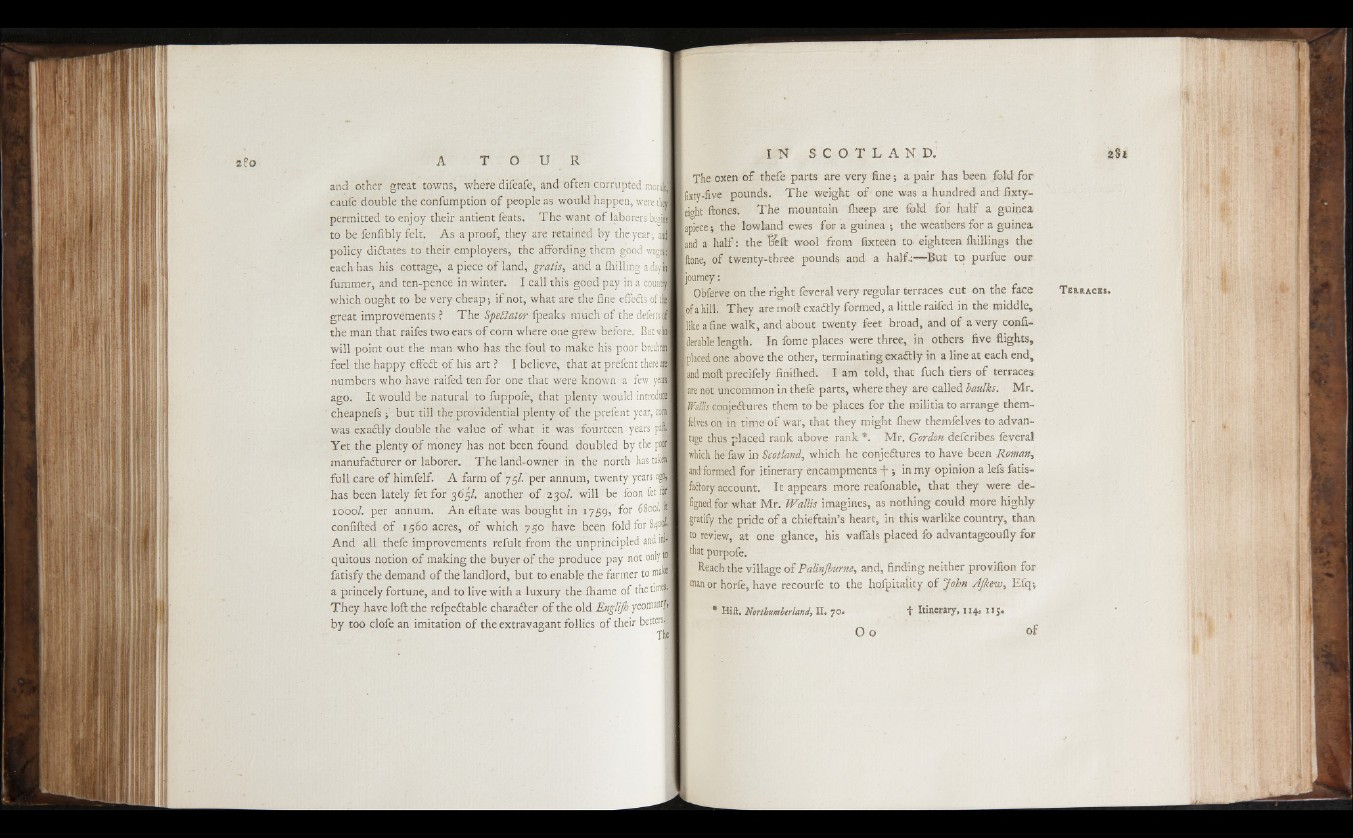
and other great towns, where difeafe, and often corrupted m o r a l
caufe double the confumption of people as would happen, w e r e t l i l
permitted to enjoy their antient feats. The want of l a b o r e r s b e g *
to be fenfibly felt. As a proof, they are retained by the y e a r ; ai
policy diitates to their employers, the affording them g o o d w age
each has his cottage, a piece of land, gratis, and a fhilling a daw
fummer, and ten-pence in winter. I call this good pay in a c o u n t g
which ought to be very cheap; if not, what are the fine e f f e d s o f tit]
great improvements ? The SpeSlator fpeaks much of the defers jé
the man that raifes two ears of corn where one grew b e f o r e . B u t w a l
will point out the man who has the foul to make his p o o r breinreii
feel the happy effeót of his art ? I believe, that at prefent th e re a i
numbers who have raifed ten for one that were known a f e w y e »
ago. It would be natural to fuppofe, that plenty would introduce]
cheapnefs ; but till the providential plenty of the prefent y e a r , com
was exaftly double the value of what it was fourteen y e a r s pijtj
Yet the plenty of money has not been found doubled by t h e p<M
manufaturer or laborer. The land-owner in the north h a s takn
full care of himfelf. A farm of 75/. per annum, twenty y e a r s iM
has been lately let for 365/. another of 230/. will be f o o n fet
1000/. per annum. An eftate was bought in 1739, for 68oo/ft
confifted of 1560 acres, of which 7 50 have been fold f o r 84011
And all thefe improvements refult from the unprincipled a n d ml
quitous notion of making the buyer of the produce pay not o n l y «
fatisfy the demand of the landlord, but to enable the farmer to mfl
a princely fortune, and to live with a luxury the ihame of the tut*
They have loft the relpeftable charadler of the old Englifh yeomanp
by too clofe an imitation of the extravagant follies of their b e t t e r *
The oxen of thefe parts are very fine; a pair has been fold for
fixty-five pounds. The weight of' one was a hundred and fixty-
Ljght ftones. The mountain Iheep are fold for half a guinea
apiece; the lowland ewes for a guinea ; the weathers for a guinea
and a half: the Beft wool from fixteen to. eighteen (hillings the
[ftone, of twenty-three pounds and a half-:— But to purfue our
journey:
I Obferve on the right feveral very regular terraces cut on the face
■of a hill. They are moft exa&ly formed, a little raifed in the middle,
[like a fine walk, and about twenty feet broad, and of a very confi-
lderable length. In fome places were three, in others five flights,
[placed one above the other, terminating exactly in a line at each end,
[and moft precifely finifhed. I am told, that fuch tiers of terraces
[are not uncommon in thefe parts, where they are called baulks. Mr.
I Wallis conjetures them to be places for the militia to arrange them-
Ifdves on in time of war, that they might ihew themfelves to advan-
Itage thus placed rank above rank *. Mr. Gordon d'efcribes feveral
I which he'faw in Scotland, which he conjetures to have been Roman,
landformed for itinerary encampments -f-; in my opinion a lefs fatis-
Ifa&ory account. It appears more reafonable, that they were de-
I figned for what Mr. Wallis imagines, as nothing could more highly
■ gratify the pride of a chieftain’s heart, in this warlike country, than
[to review, at one glance, his vaffals placed fo advantageouily for
[that purpofe.
I Reach the village of Palmjburne, and, finding neither provifion for
I manor horfe, have recourfe to the hofpitality of John AJkew, Efq;
T e r r a c e s .
* Hi it. Northumberland, II. jo . 1 Itinerary, 1 14 , 115*
O o o f